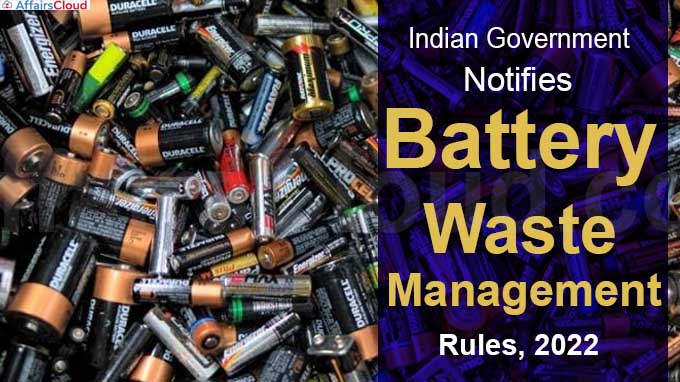
On August 24, 2022, the Ministry of Environment, Forest and Climate Change (MoEF&CC) issued Battery Waste Management Rules, 2022 by replacing Batteries (Management and Handling) Rules, 2001 to ensure environmentally sound management of waste batteries.
- These rules are a step towards promoting the Circular Economy.
Key Points:
i.The rules cover all types of batteries, viz. Electric Vehicle batteries, portable batteries, automotive batteries and industrial batteries.
ii.The rules function based on the concept of Extended Producer Responsibility (EPR) where the producers (including importers) of batteries are responsible for collection and recycling/refurbishment of waste batteries and use of recovered materials from wastes into new batteries.
iii.These will enable setting up a mechanism and centralized online portal for exchange of EPR certificates between producers and recyclers to fulfil the obligations of producers.
- The rules also promote setting up of new industries and entrepreneurship in collection and recycling/refurbishment of waste batteries.
iv.They will mandate the minimum percentage of recovery of materials from waste batteries which will bring new technologies and investment in recycling and refurbishment industry.
v.Prescribing the use of certain amount of recycled materials in making of new batteries will reduce the dependency on new raw materials and save natural resources.
vi.There will be online registration & reporting, auditing, and committee for monitoring the implementation of rules.
vii.Under the Rules, the consumers will have to discard waste batteries separately from other waste streams.
Imposition of Environmental Compensation:
On the Principle of Polluter Pays, environmental compensation will be imposed for non-fulfilment of EPR targets, responsibilities and obligations by respective State Pollution Control Board. The funds collected under environmental compensation will be utilized in collection and refurbishing or recycling of uncollected and non-recycled waste batteries.
i.Non-fulfilment of obligations by producers and recyclers will attract penal actions under the provisions of section 15 of the Environment (Protection)-EP Act, 1986.
ii.The penal actions under the EP Act, 1986 currently include imposing fine up to Rs 1 lakh or/and jail term up to 7 years with provisions of additional fines and extended imprisonment for repeated instances of non-compliance.
What is EPR?
It mandates that all waste batteries to be collected and sent for recycling/refurbishment, and prohibits disposal in landfills and incineration. To meet the EPR obligations, producers may engage themselves or authorize any other entity for collection, recycling or refurbishment of waste batteries.
Recent Related News:
i.On 29th July 2022 Reliance New Energy Limited, Ola Electric Mobility and Rajesh Exports, Indian Multinational Gold Retailer signed the program agreement under Production Linked Incentives (PLI) scheme to build a total of 50 gigawatt hours (Gwh) Advanced Chemistry Cell (ACC) battery storage.
ii.On June 28, 2022, a report titled ‘Forecasting Penetration of Electric Two-Wheelers (e-2W) in India- A Bottom-Up Analysis’ has been launched by National Institution for Transforming India (NITI) Aayog, and Technology Information Forecasting and Assessment Council (TIFAC).
About Ministry of Environment, Forest and Climate Change (MoEFCC):
Union Minister– Bhupender Yadav (Rajya Sabha – Rajasthan)
Minister of State (MoS)– Ashwini Kumar Choubey (Constituency- Buxar, Bihar)




